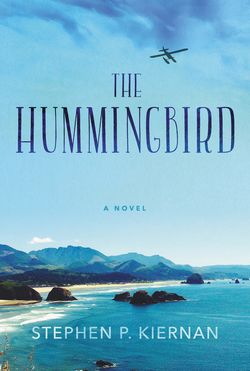 Stephen P. Kiernan might be a familiar name to you because he wrote The Curiosity, which received numerous accolades in 2013.
Stephen P. Kiernan might be a familiar name to you because he wrote The Curiosity, which received numerous accolades in 2013.
He is back with his second novel, The Hummingbird (on sale 9/8), about a woman who must take care of two wounded men —one, her soldier-husband, just home from the war in Iraq; the other, a dying World War II scholar-historian who harbors a long-buried secret.
Stephen has dropped by the blog today to share the importance of libraries in his life.
*****
When I was ten, a librarian handed me the Ray Bradbury short story collection, R is for Rocket. Over the next six months I read every word Bradbury had ever written, culminating in Fahrenheit 451. There’s a book to open young minds.
When I was twelve, a librarian suggested I try The Hobbit. I spent that entire summer lying on my side in the grass with Tolkien before me, one volume after another, rolling over to my other side when my wrist grew sore from holding my head up.
As I was writing my first novel, The Curiosity, one scene required a knowledge of early baseball. A librarian handed me Boston’s Royal Rooters by Peter Nash – less famous than The Fellowship of the Ring but essential to me at the time. I learned about team managers who were also pitchers throwing both games in a double header, for a dollar’s pay. And when I was researching World War II for my new novel, The Hummingbird, a librarian provided me with The Rising Sun by John Toland, and I understood what happened in the Pacific Theater for the first time.
Perhaps it is no wonder, then, that two pivotal moments in that novel occur in libraries.
Deborah Birch, a hospice nurse and the novel’s narrator, is caring for a retired history professor, so she decides to track down one of his books. Since he taught at the same university she attended, she goes to that school’s massive library. Inexplicably, his books are not on the shelves.
Naturally this discovery raises questions about the professor’s past. It also touches on the apprehension we all have about libraries remaining sacrosanct – not as tools in the war on terror or places where political agendas play out, but as havens of free thinking and learning. We’re sensitive to the removal of any book from a shelf because of its content, and perhaps we ought to be.
The second library moment is the next to last scene in the book. Deborah drives six hours down the winding Oregon coast highway to a community library where the truth about the professor will finally be revealed.
I can’t tell you what she finds, because it would spoil the fun. Nor will I say for certain that the library’s head of reference is an angel – though he is indeed dressed all in white, and wearing wings. He says it’s a costume for a children’s reading program about to begin. But then he directs her to information that will change her life, and that of her soldier husband, just home from Iraq.
The narrative eye follows Deborah as she reads, and learns, and drives back up that highway to bring her husband some literally lifesaving news. But in my imagination, off camera, among the group of kids in that children’s program there is a ten year old boy. He’s about to be handed a book, and his life will never be the same.
*****
Thank you, Stephen!
Be sure to order your copies today!
– Annie
